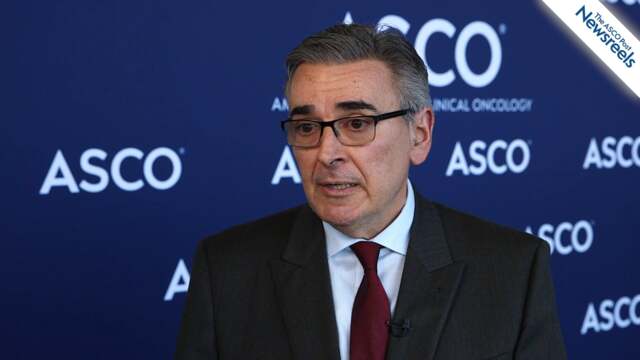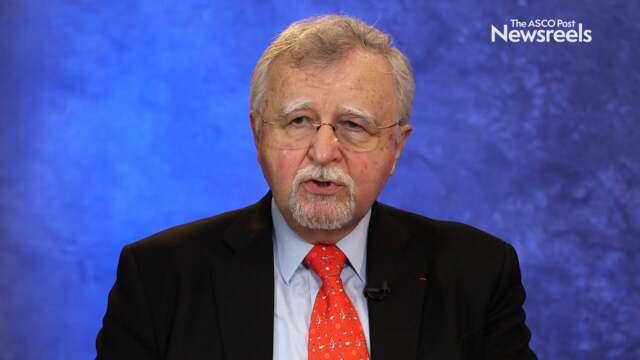Peter Schmid, MD, PhD, on Triple-Negative Breast Cancer: Results From the PAKT Trial
Peter Schmid, MD, PhD, of Queen Mary University of London, discusses phase II study findings on AZD5363 plus paclitaxel vs placebo plus paclitaxel as first-line therapy for metastatic triple-negative breast cancer (Abstract 1007).
Joseph A. Sparano, MD, on Breast Cancer: Results of the TAILORx Trial
Joseph A. Sparano, MD, of Montefiore Medical Center, discusses phase III study results on chemoendocrine treatment vs endocrine treatment alone in hormone receptor–positive, HER2-negative, node-negative breast cancer and an intermediate prognosis 21-gene recurrence score (Abstract LBA1).
2018 ASCO: TAILORx: Most Women With Early-Stage Breast Cancer Can Forgo Chemotherapy When Guided by a Diagnostic Test
The federally funded, phase III TAILORx clinical trial showed that most women with hormone receptor (HR)–positive, HER2-negative, axillary node–negative early-stage breast cancer and a mid-range score on a 21-tumor gene expression assay (Oncotype DX® Breast Recurrence Score) do not...
Gabriel N. Hortobagyi, MD, on Breast Cancer Staging: New and Important Changes
Gabriel N. Hortobagyi, MD, of The University of Texas MD Anderson Cancer Center, discusses the 8th edition of the TNM staging system, which includes prognostic stage groups based on clinical and pathologic factors combined with grade and hormone and HER2 status.
2018 ASCO: Phase III SANDPIPER Trial Evaluates Taselisib Plus Fulvestrant in Advanced Breast Cancer
In a phase III clinical trial, the investigational PI3K inhibitor taselisib combined with standard hormone therapy fulvestrant (Faslodex) halted the growth of advanced breast cancer growth by 2 months longer than hormone therapy alone. In addition, the novel combination decreased the chance of...
Multiple-Gene Sequencing vs BRCA1/2-Only Testing After Breast Cancer Diagnosis
In a retrospective cohort study reported in JAMA Oncology, Kurian et al found that use of germline multiple-gene sequencing has become more common than BRCA1/2-only sequencing after breast cancer diagnosis in clinical practice, with an associated increased detection of pathologic variants not...
Education Came First for Breast Cancer Expert Beverly Moy, MD, MPH, Daughter of Chinese Immigrants
Beverly Moy, MD, MPH, grew up in Brooklyn, New York, in a modest working-class home. Both her parents were immigrants from China. “Education is highly prized in Chinese culture, and my home life was no exception. I didn’t speak any English when I began kindergarten, so that was a bit challenging,...
Tumor-Infiltrating Lymphocytes and Prognosis in Breast Cancer Subtypes
In a study reported in The Lancet Oncology by Denkert and colleagues, increased levels of tumor-infiltrating lymphocytes (TILs) in women receiving neoadjuvant chemotherapy were associated with improved prognosis in HER2-positive and triple-negative breast cancers but poorer outcome in luminal...
Hormonal Contraception and Breast Cancer Risk
As reported in The New England Journal of Medicine by Lina S. Mørch, PhD, of the University of Copenhagen, and colleagues, a Danish study has shown that the risk of breast cancer is increased in hormonal contraception users vs nonusers, with the absolute increase in risk being small. The study...
Circulating Tumor Cells and Benefit of Adjuvant Radiotherapy in Early Breast Cancer
In a study reported in JAMA Oncology, Goodman et al found that adjuvant radiotherapy was associated with better outcome in patients with early breast cancer who had detectable circulating tumor cells (CTCs). Study Details The analysis included data from patients with stage pT1 to pT2 and pN0 to...
NCCN Clinical Practice Guidelines in Oncology (NCCN Guidelines®): 2018 Guidelines Updates
In 1996, the National Comprehensive Cancer Network® (NCCN®) published its first set of Clinical Practice Guidelines in Oncology (NCCN Guidelines®) covering 8 tumor types. Guidelines are now published for more than 60 tumor types and topics. Some of the key updates were presented at NCCN’s 23rd...
Endocrine Therapy: An Important Treatment Limited by Major Challenges
“Endocrine therapy remains the most effective and least toxic treatment for breast cancer, but we have many problems to solve. And there will have to be many different solutions,” according to George W. Sledge, MD, FASCO, Professor of Medicine and Chief of the Division of Oncology at Stanford...
For Adjuvant Trastuzumab, 6 Months Is Noninferior to 12 Months
The noninferiority phase III Persephone trial could shake up the standard of care for adjuvant trastuzumab (Herceptin), showing that patients with early-stage HER2-positive breast cancer derived as much benefit from 6 months of trastuzumab as 12 months, according to research from the United Kingdom ...
Effect of GnRHa Treatment During Chemotherapy on Preservation of Ovarian Function and Fertility in Premenopausal Patients With Early Breast Cancer
A meta-analysis of patient-level data reported by Lambertini et al in the Journal of Clinical Oncology indicated that temporary ovarian suppression with gonadotropin-releasing hormone agonists (GnRHa) during chemotherapy was effective in preserving ovarian function and fertility in premenopausal...
Risk of Interval Invasive Second Breast Cancers
In a study reported in the Journal of Clinical Oncology, Lee et al determined risk levels for interval invasive second breast cancers after negative surveillance mammography and identified factors associated with higher risk. Study Details The study involved 65,084 surveillance mammograms...
Risk of Breast Cancer After Negative Screening Mammography
In a study reported in JAMA Oncology, McCarthy et al identified the risk of interval breast cancer after negative screening mammography, including risk of poor-prognosis breast cancer. Study Details The study involved mammography data from the Population-Based Research Optimizing Screening...
CXCR4 Antagonist Plus Eribulin in HER2-Negative Metastatic Breast Cancer
Findings in a phase I trial reported in The Lancet Oncology by Pernas et al indicate activity of the combination of the CXCR4 chemokine receptor antagonist balixafortide plus eribulin in previously treated HER2-negative metastatic breast cancer. The CXCR4–stromal cell-derived factor-1α...
2018 ASCO: Shortening Adjuvant Trastuzumab to 6 Months in Patients With HER2-Positive Early Breast Cancer Is Effective and Reduces Cardiac Toxicities
Persephone, a large phase III randomized noninferiority study conducted in the United Kingdom comparing 6 months to 12 months of trastuzumab (Herceptin) in patients with HER2-positive early breast cancer has found 6 months of trastuzumab to be noninferior to 12 months of the therapy. In addition,...
Sarcopenia, Adiposity, and Survival in Women With Nonmetastatic Breast Cancer
In a study reported in JAMA Oncology, Caan et al found that computed tomography (CT)-derived sarcopenia and adiposity were associated with overall survival in women with nonmetastatic breast cancer. Study Details The study involved data from 3,241 women from Kaiser Permanente of Northern...
Hormone Replacement Therapy and Breast Cancer Risk After Oophorectomy in BRCA1-Mutation Carriers
In a study reported in JAMA Oncology, Kotsopoulos et al found that use of hormone replacement therapy overall did not increase risk of breast cancer among BRCA1-mutation carriers after prophylactic bilateral salpingo-oophorectomy; however, use of estrogen-progesterone hormone replacement...
Can Some Patients With Early Breast Cancer Avoid Surgery?
RESEARCHERS AT The University of Texas MD Anderson Cancer Center are testing the possibility of safely eliminating surgery in patients with breast cancer who are “exceptional responders” to neoadjuvant therapy, according to Henry M. Kuerer, MD, PhD, a breast cancer surgeon who described this...
Predictive Model for Breast Cancer in Women With Atypical Hyperplasia
As reported in the Journal of Clinical Oncology, Degnim et al have developed a model for predicting breast cancer risk among women with atypical hyperplasia on breast biopsy. Study Details The risk model (AH-BC) was developed using retrospective cohorts of women aged 18 to 85 years with...
ASBrS 2018: Early Detection and Intervention Effective for Preventing Breast Cancer–Related Lymphedema
Early, ongoing screening of lymphatic function and immediate patient-administered therapies as needed are highly effective in improving outcomes for women at high risk for breast cancer–related lymphedema (BCRL). These were the findings of a new study presented at the American Society of ...
ASBrS 2018: Modern Therapies Minimize Recurrence After Breast-Conserving Surgery
Modern, multimodality lumpectomy treatment significantly reduces the incidence of breast cancer recurrence at the original tumor site compared to historical protocols, according to a new study presented at the American Society of Breast Surgeons (ASBrS) 19th Annual Meeting (Abstract...
ASBrS 2018: Breast Cancer Genetic Testing Guidelines Exclude Almost Half of High-Risk Patients
Current restrictive genetic testing guidelines exclude many patients who harbor high-risk breast cancer mutations, according to two new studies presented at the American Society of Breast Surgeons (ASBrS) 19th Annual Meeting (Abstracts 402910, 404340). One study found that whether or not patients...
ASBrS 2018: Regular Mammograms May Mean Earlier Breast Cancer Diagnosis and Less Aggressive Treatment
Women with breast cancer who underwent regular mammographic screening were diagnosed with earlier-stage disease and treated with significantly less aggressive therapies than those who delayed or never underwent screening, according to new research presented at the American Society of Breast...
Targeting Chemotherapy With Genetic Testing in Advanced Triple-Negative Breast Cancer
Researchers have found that women with advanced triple-negative breast cancer with a BRCA mutation were twice as likely to benefit from carboplatin as docetaxel—the current standard of care for these patients. These findings were published by Tutt et al in Nature Medicine. The trial is set...
Web-Based Writing Intervention for Body Image–Related Distress in Women With Breast Cancer
In an Australian trial reported in the Journal of Clinical Oncology, Sherman et al found that use of a structured online writing exercise (My Changed Body) was associated with reduced body image distress and improved body appreciation among breast cancer survivors. Study Details My Changed...
Dispel Fears About Breast Cancer Radiotherapy With ‘Real Truth’ About Modern Techniques and Side Effects
Nearly 85% of patients surveyed 6 or more months after completing radiotherapy as part of their treatment for breast cancer reported the side effects were not as bad as they had feared or expected. Approximately 92% of the 269 patients treated with breast conservation and 81% of the 58 patients...
Hormone Therapy and Diabetes Risk in Survivors of Breast Cancer
In an Israeli case-cohort study reported in the Journal of Clinical Oncology, Hamood et al found that hormone therapy in breast cancer survivors was associated with an increased risk of developing diabetes. The study involved a cohort of 2,246 women from the Leumit health-care fund diagnosed with...
Long-Term Quality-of-Life Results Compared for Two Radiotherapy Strategies After Breast-Conserving Surgery
As reported in The Lancet Oncology by Schäfer et al, little difference in quality of life was observed over long-term follow-up between women receiving accelerated partial-breast irradiation (APBI) with interstitial brachytherapy vs whole-breast irradiation (WBI) after breast-conserving...
Prediction of Late Distant Recurrence in Estrogen Receptor–Positive Breast Cancer After 5 Years of Endocrine Therapy
As reported in the Journal of Clinical Oncology, Dowsett et al have developed a clinicopathologic tool for predicting risk of late distant recurrence in estrogen receptor (ER)-positive breast cancer treated with 5 years of endocrine therapy. Study Details In the study, a prognostic score for...
New Breath and Urine Tests May Detect Early Breast Cancer More Accurately
A new method for early, more accurate breast cancer screening has been developed by researchers at Ben-Gurion University of the Negev and Soroka University Medical Center using commercially available technology. Their findings were published by Herman-Saffar et al in Computers in Biology and...
Adverse Financial Impact of Breast Cancer for Black vs White Women
In a study reported in the Journal of Clinical Oncology, Wheeler et al found that black women experience significantly worse financial impact from breast cancer compared with white women, which may contribute to barriers to treatment compliance and worse outcomes. Study Details The...
Addition of Everolimus to Fulvestrant in HR-Positive, HER2-Negative, Aromatase Inhibitor–Resistant Metastatic Breast Cancer
In the phase II PrE0102 trial reported in the Journal of Clinical Oncology by Kornblum et al, the addition of everolimus to fulvestrant (Faslodex) improved progression-free survival in postmenopausal women with hormone receptor (HR)-positive, HER2-negative metastatic breast cancer resistant to...
Many Economic Evaluations of Oncotype DX May Have Misleading Conclusions
Research from the Yale School of Public Health has found that the majority of published papers analyzing the cost-effectiveness of a widely used test for breast cancer used a study design that can increase bias. These findings were published by Wang et al in the Journal of Clinical Oncology....
Family History and Contralateral Breast Cancer Risk in Young Women
In an update from the WECARE (Women’s Environmental Cancer and Radiation Epidemiology) study reported in the Journal of Clinical Oncology, Reiner et al found that women with invasive breast cancer are at increased risk of contralateral breast cancer even in the absence of deleterious...
FDA Grants Fast Track Designation for Balixafortide in Combination With Eribulin as Third-Line Therapy for Metastatic Breast Cancer
On April 19, Polyphor announced that the U.S. Food and Drug Administration (FDA) granted Fast Track designation for its novel immuno-oncology candidate balixafortide (POL6326) in combination with eribulin (Halaven) for the treatment of patients with HER2-negative metastatic breast cancer who...
Modest Weight Loss Reduces Breast Cancer Risk
Evidence of the numerous health benefits of weight loss continues to mount, and the hope is that doctors and patients are listening. A large observational study presented at the 2017 San Antonio Breast Cancer Symposium showed that weight loss of more than 5% is associated with a significantly lower ...
Talazoparib Reduces Risk of Disease Progression in BRCA-Mutated Breast Cancer
In patients with BRCA-positive advanced breast cancer, talazoparib reduced the risk of disease progression or death by 46% vs chemotherapy, according to the phase III EMBRACA trial presented at the 2017 San Antonio Breast Cancer Symposium.1 “We are very pleased that the EMBRACA trial—the largest...
Education Plus Exercise Improves Arm Mobility After Lymph Node Dissection in Women With Breast Cancer
In breast cancer survivors after lymph node dissection, a combined education and exercise intervention resulted in patients regaining full range of motion in both arms sooner than those who received education alone, according to follow-up from a phase III clinical trial reported by Electra D....
2018 Treatment Algorithm for Metastatic HER2-Positive Breast Cancer
How should clinicians position anti-HER2 agents and also incorporate endocrine therapies in the treatment of metastatic HER2-positive breast cancer? At the 2018 Miami Breast Cancer Conference, this question was explored by Sunil Verma, MD, Medical Director of the Tom Baker Cancer Center and...
mTOR Inhibitor Plus Endocrine Therapy in Postmenopausal Women With Advanced ER-Positive, HER2-Negative Breast Cancer
In the phase II BOLERO-4 trial reported in JAMA Oncology, Royce et al found that the combination of the mTOR inhibitor everolimus (Afinitor) and endocrine therapy was active in first-line treatment of postmenopausal women with advanced estrogen receptor (ER)-positive, human epidermal growth factor...
Expert Point of View: Timothy Gilligan, MD, MSc
“IN THE PAST, patients were often told to rest and reduce their physical activity during treatment, but we now know that exercise is both safe and beneficial,” said Timothy Gilligan, MD, MSc, moderator of a presscast where these results were presented prior to the Cancer Survivorship Symposium....
Four Years Posttreatment, Exercise Improves Physical Activity Levels, Reduces Fatigue in Patients With Breast and Colon Cancers
IN PATIENTS WITH breast and colon cancers, a physical exercise intervention conducted during adjuvant chemotherapy improved total physical activity levels 4 years after treatment, with a trend toward less fatigue, according to a follow-up study from the randomized multicenter PACT study, presented...
Cardiovascular Risk Factors, Cardiac Events, and Survival in Patients With Breast Cancer Enrolled in SWOG Clinical Trials
In a study reported in the Journal of Clinical Oncology, Hershman et al found that each additional baseline cardiovascular disease risk factor was associated with increased risk for cardiac events and death among Medicare patients who had been enrolled in SWOG trials in breast cancer. Study...
How Will ctDNA Assays Aid in Managing Breast Cancer?
CIRCULATING TUMOR DNA (ctDNA) assays are now commercially available for use in lung cancer and melanoma, where they can identify the presence of specific mutations that drive treatment selection. In breast cancer, ctDNA remains more of a research tool, but this is poised to change. At the 2018...
Potent Anti-HER2 Agents on the Horizon
THANKS TO the efficacy of five approved anti-HER2 agents, patients with HER2-positive breast cancer have overall survival numbers that are as good as, or better than, their HER2-negative counterparts. With the next generation of anti-HER2 therapies in clinical trials, these outcomes may become even ...
EBCC-11: Mastectomy and Axillary Dissection and Neoadjuvant Targeted Treatment in HER2-Positive Breast Cancer
Extensive surgery involving mastectomy and removal of several lymph nodes may be safely avoided for more women with some types of breast cancer if they receive targeted drugs before surgery, according to research presented at the 11th European Breast Cancer Conference (EBCC-11) (Abstract 19). The...
Extended Duration of Aromatase Inhibitors Need Not Be Very Long
At the 2017 San Antonio Breast Cancer Symposium (SABCS), Michael Gnant, MD, FACS, of the Medical University of Vienna presented the 9-year median follow-up of a trial looking at the length of extended aromatase inhibitor therapy. At least four other recently presented or published trials have...



